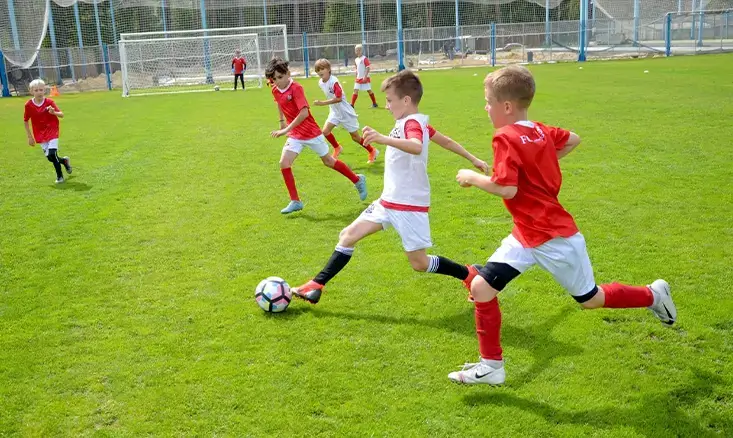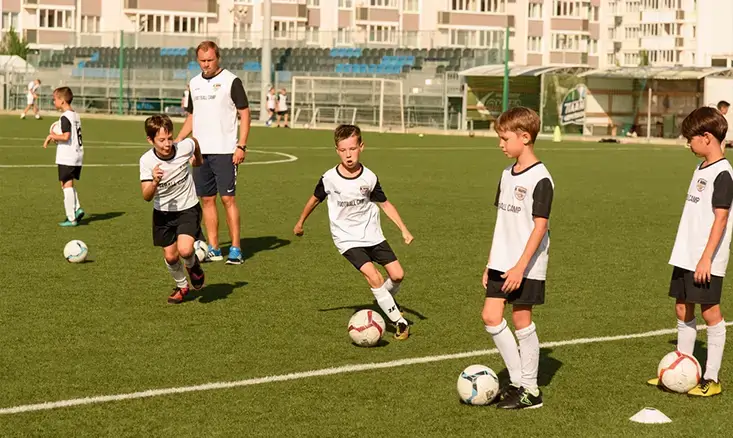CRFC BLOGS
LATEST BLOGS & NEWSLETTERS
Benefits of Youth Soccer: Building Healthy and Confident Kids
Youth soccer is more than just kicking a ball around; it’s a journey of growth, learning, and connection. Soccer is one of the most popular sports in the world. It offers kids a fun way to stay active while teaching essential life skills.
Let’s explore the benefits of youth soccer, how the game impacts children’s physical health, mental sharpness, and social development.
Why Is Soccer the Perfect Sport for Kids?
Beyond being fun and inclusive, soccer offers countless benefits that extend far beyond the field. From the physical benefits of playing soccer to its role in building character, this sport has a unique way of shaping young lives.
1. Physical Benefits of Playing Soccer
-
Boosts Cardiovascular Health
Soccer involves constant running, sprinting, and quick changes in direction. This keeps the heart pumping and strengthens cardiovascular fitness. Regular play improves stamina, lowers the risk of heart disease, and sets a foundation for a healthy lifestyle.
-
Strengthens Muscles and Bones
Activities like kicking, jumping, and quick turns improve muscle tone and bone density, reducing the risk of fractures and other injuries.
-
Enhances Coordination and Agility
Soccer requires players to master dribbling, passing, shooting, and defending. Over time, kids develop excellent hand-eye coordination, balance, and agility, which benefit them both on and off the field.
-
Year-Round Activity with Indoor Soccer
During colder months, indoor soccer provides an excellent alternative. The smaller playing space encourages faster footwork and sharper reflexes, adding a new dimension to the game. The benefits of playing indoor soccer also include year-round fitness and the ability to play regardless of weather conditions.

2. Mental Benefits of Soccer
-
Improves Focus and Concentration
Soccer is a fast-paced game that demands constant attention. Players must track the ball, read opponents’ moves, and plan their next steps. This sharpens focus and concentration, skills that are transferable to school and other activities.
-
Builds Confidence and Self-Esteem
Every goal scored or successful play boosts a child’s confidence. Soccer provides opportunities to achieve small, meaningful victories, helping kids feel capable and proud of their accomplishments.
-
Encourages Problem-Solving and Decision-Making
Soccer is unpredictable—players must think on their feet and make quick decisions. Whether deciding when to pass or how to defend, these moments build problem-solving skills and adaptability.
3. Social Benefits of Playing Soccer for Kids
-
Teaches Teamwork and Collaboration
Soccer is a team sport, and success depends on players working together. Kids learn how to support their teammates, communicate effectively, and collaborate toward shared goals.
-
Develops Communication Skills
On the field, players communicate constantly—whether they’re calling for the ball or guiding teammates during plays. This enhances verbal and non-verbal communication, helping kids express themselves more confidently.
-
Develops Friendships and Connections
Soccer brings kids together, often forging friendships that last a lifetime. It’s a great way for children to connect with fellow teammates from diverse backgrounds, teaching them empathy and understanding.

4. Life Lessons Learned Through Soccer
-
Instills Discipline and Perseverance
Regular practice and training require commitment and hard work. Soccer teaches kids to set goals, stay dedicated, and persevere through challenges, valuable traits they’ll carry into adulthood.
-
Teaches Resilience and Adaptability
In soccer, losing a game or missing a goal is part of the experience. These moments teach kids how to handle setbacks, stay positive, and bounce back stronger—a skill that’s invaluable in life.
-
Develops Leadership Skills
Soccer encourages kids to take on leadership roles, whether as a team captain or by setting a positive example. These leadership opportunities help kids build confidence and learn responsibility.
5. Unique Advantages of Indoor Soccer
-
Encourages Quick Thinking
The smaller playing area of indoor soccer means faster gameplay. Kids learn to react quickly and make quick decisions, sharpening their reflexes and decision-making skills.
-
Promotes Close-Knit Team Dynamics
Indoor soccer teams are usually smaller, which creates stronger bonds between players. It enhances teamwork and communication.

6. Soccer’s Impact on Communities
-
Unites People
Soccer is a universal sport that connects people from all walks of life. Youth soccer brings families and communities together, creating a sense of unity and shared purpose.
-
Promotes Cultural Exchange
With its global popularity, soccer exposes kids to different cultures and traditions. Playing alongside teammates from diverse backgrounds teaches kids respect, tolerance, and the value of diversity.
Why Should Parents Encourage Soccer?
Parents play a crucial role in encouraging their children to try new activities. Soccer is an affordable and accessible sport that provides a safe, enjoyable environment for kids to grow. The physical benefits of playing soccer combined with the ability to teach resilience and teamwork make soccer one of the best activities for children to develop holistically.
Conclusion
The benefits of youth soccer are undeniable. It’s a sport that improves health, sharpens the mind, builds relationships, and teaches life lessons. Whether your child is playing outdoors or exploring the unique benefits of playing indoor soccer, the game offers endless opportunities for growth.
FAQs
What are the physical benefits of youth soccer?
Soccer keeps kids active and healthy by improving their stamina, building strong muscles and bones, and enhancing coordination and agility.
How does soccer help with mental development?
Soccer sharpens focus, boosts confidence, and builds problem-solving skills. The fast-paced game challenges players to think quickly and adapt, which helps in school and everyday life.
What life skills do kids learn from playing soccer?
Kids learn teamwork, discipline, and resilience on the soccer field. Overcoming challenges, setting goals, and working with teammates prepare them for real-life situations.
Can soccer improve social skills?
Absolutely! Soccer teaches communication and collaboration while building friendships. Being part of a team develops empathy and creates strong, lasting connections.
Why should parents encourage soccer?
Soccer is affordable and inclusive with multiple benefits. It helps kids grow physically, mentally, and socially in a safe and supportive environment, making it one of the best activities.

Did you find this useful?


